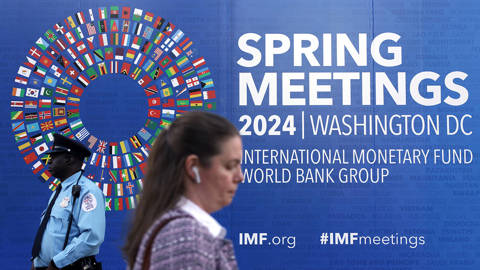Jordanians are facing sleepless nights as the siege of Baghdad proceeds. The images coming to us from next door are horrifying, and Jordanians have taken to the street in protest. Yet while contemplating the collapse of Saddam's regime, Jordanians are also now recognizing how closely our own society is tied to Iraq's, and how difficult it will be for Jordan to set out on a new course if the Americans end the rule of Saddam Hussein.
At the economic level, Jordan's ties with Iraq are very close. Nearly all of our oil comes from Iraq at highly subsidized rates. Replacing this oil at market prices could cost more than $600 million a year.
Former Minister of Trade and Industry Mohammad al-Samadi estimates that Iraqis buy more than $500 million of Jordanian goods annually. Our trucking industry - 5000 mostly family-owned trucks - is largely dependent on this trade. How much of it will be lost, particularly if a new regime in Baghdad punishes Jordan for its close ties with the Iraqi government, is a worrying question. Fahed al-Fanek, a leading Jordanian economist, estimates that the war could cost Jordan as much as 25% of its GDP, about $2 billion.
Such losses could be devastating. Increased debt and budget deficits are one likely result, putting at risk the accomplishments of more than a decade of effort to reform the economy. Already, we are expecting the tough conditions of the IMF's reform program to be extended from five years to six.
But economic closeness is merely the tip of the Iraqi-Jordanian relationship. Through business dealings, the Iraqi regime insinuated itself into the Jordanian elite, coloring our own political culture. Many prominent Jordanians believe that our reliance on Iraqi markets and oil ought to be the basis of a priority alliance.
Indeed, the complicated networks of commercial relationships help shape the views of political groups, the media, bankers and contractors. Not only are Jordanians largely silent about the practices of the Iraqi regime, but also they are sceptical about efforts to bring reform or greater openness to Jordan. Maintaining the status quo is their priority, despite the international cost to Jordan's reputation or the consequences for the Iraqi people. They cast any criticism of Saddam as a willingness to accept American aggression.
For example, a recent Jordanian decision to freeze all Iraqi government funds held in Jordanian banks produced accusations by the Jordanian opposition that Jordan had stabbed Iraq in the back. Likewise, there was criticism of the government's recent decision to expel three Iraqi diplomats for activities threatening Jordan's security.
Within Jordan, however, there is another perspective on the future, one that welcomes reduced dependence on Iraq. Former Foreign Minister Abdullah al-Khatib argues that Jordan should have begun distancing itself from Iraq years ago. Rejecting the idea of a holy alliance between the two countries, al-Khatib said, ``This relationship was not a strategic alliance between the two countries, but a relationship of mutual interests and benefits.''
While Jordan's access to discounted Iraqi oil was clear for all to see, the benefits to Iraq have not been as visible. Observers interpret al-Khatib's comments as a reference to the passage of vast amounts of luxury goods through Jordan into Iraq, one of the means by which Saddam has been able to reward his followers. Others note the presence of numerous Iraqi businesses in Jordan, conducting activities whose purposes have not always been clear.
Although Jordan is at a turning point in its relations with Iraq, there remains little public support for American policy. More than 80% of Jordanians oppose the war. Speculation about America's motives, with press commentators highlighting the role of the Christian right-wing in formulating American policy, is increasing. Links between US Christians and American support for the expansionist Sharon government in Israel are heard frequently.
Within the Arab world, moderate and liberal groups are losing ground to radical Islamic movements. Confronting the West, particularly the US, has become the common theme of opposition to the war. Advocates of more democracy in the Arab world now risk being accused of cooperation with the American design for re-making the Middle East.
The only way to begin to turn this tide is for the US to reverse its primarily unilateral approach to the region's problems. To many Arabs across the region, American reliance on overwhelming military force to achieve its stated goal of spreading democracy is an inherent contradiction.
A critical test awaits in how the US handles post-war Iraq. If it chooses to take the predominant role in transforming the Iraqi government, instead of relying on the UN, Arab doubts will grow. A second test lies in American handling of the Israeli-Palestinian conflict. The US now has an opportunity to address the Palestinians' need to be free from military occupation. If America misses these opportunities and continues on its current course, it risks exacerbating the issues and conflicts in the region and destabilizing friends like Jordan.










Jordanians are facing sleepless nights as the siege of Baghdad proceeds. The images coming to us from next door are horrifying, and Jordanians have taken to the street in protest. Yet while contemplating the collapse of Saddam's regime, Jordanians are also now recognizing how closely our own society is tied to Iraq's, and how difficult it will be for Jordan to set out on a new course if the Americans end the rule of Saddam Hussein.
At the economic level, Jordan's ties with Iraq are very close. Nearly all of our oil comes from Iraq at highly subsidized rates. Replacing this oil at market prices could cost more than $600 million a year.
Former Minister of Trade and Industry Mohammad al-Samadi estimates that Iraqis buy more than $500 million of Jordanian goods annually. Our trucking industry - 5000 mostly family-owned trucks - is largely dependent on this trade. How much of it will be lost, particularly if a new regime in Baghdad punishes Jordan for its close ties with the Iraqi government, is a worrying question. Fahed al-Fanek, a leading Jordanian economist, estimates that the war could cost Jordan as much as 25% of its GDP, about $2 billion.
Such losses could be devastating. Increased debt and budget deficits are one likely result, putting at risk the accomplishments of more than a decade of effort to reform the economy. Already, we are expecting the tough conditions of the IMF's reform program to be extended from five years to six.
But economic closeness is merely the tip of the Iraqi-Jordanian relationship. Through business dealings, the Iraqi regime insinuated itself into the Jordanian elite, coloring our own political culture. Many prominent Jordanians believe that our reliance on Iraqi markets and oil ought to be the basis of a priority alliance.
Indeed, the complicated networks of commercial relationships help shape the views of political groups, the media, bankers and contractors. Not only are Jordanians largely silent about the practices of the Iraqi regime, but also they are sceptical about efforts to bring reform or greater openness to Jordan. Maintaining the status quo is their priority, despite the international cost to Jordan's reputation or the consequences for the Iraqi people. They cast any criticism of Saddam as a willingness to accept American aggression.
SPRING SALE: Save 40% on all new Digital or Digital Plus subscriptions
Subscribe now to gain greater access to Project Syndicate – including every commentary and our entire On Point suite of subscriber-exclusive content – starting at just $49.99.
Subscribe Now
For example, a recent Jordanian decision to freeze all Iraqi government funds held in Jordanian banks produced accusations by the Jordanian opposition that Jordan had stabbed Iraq in the back. Likewise, there was criticism of the government's recent decision to expel three Iraqi diplomats for activities threatening Jordan's security.
Within Jordan, however, there is another perspective on the future, one that welcomes reduced dependence on Iraq. Former Foreign Minister Abdullah al-Khatib argues that Jordan should have begun distancing itself from Iraq years ago. Rejecting the idea of a holy alliance between the two countries, al-Khatib said, ``This relationship was not a strategic alliance between the two countries, but a relationship of mutual interests and benefits.''
While Jordan's access to discounted Iraqi oil was clear for all to see, the benefits to Iraq have not been as visible. Observers interpret al-Khatib's comments as a reference to the passage of vast amounts of luxury goods through Jordan into Iraq, one of the means by which Saddam has been able to reward his followers. Others note the presence of numerous Iraqi businesses in Jordan, conducting activities whose purposes have not always been clear.
Although Jordan is at a turning point in its relations with Iraq, there remains little public support for American policy. More than 80% of Jordanians oppose the war. Speculation about America's motives, with press commentators highlighting the role of the Christian right-wing in formulating American policy, is increasing. Links between US Christians and American support for the expansionist Sharon government in Israel are heard frequently.
Within the Arab world, moderate and liberal groups are losing ground to radical Islamic movements. Confronting the West, particularly the US, has become the common theme of opposition to the war. Advocates of more democracy in the Arab world now risk being accused of cooperation with the American design for re-making the Middle East.
The only way to begin to turn this tide is for the US to reverse its primarily unilateral approach to the region's problems. To many Arabs across the region, American reliance on overwhelming military force to achieve its stated goal of spreading democracy is an inherent contradiction.
A critical test awaits in how the US handles post-war Iraq. If it chooses to take the predominant role in transforming the Iraqi government, instead of relying on the UN, Arab doubts will grow. A second test lies in American handling of the Israeli-Palestinian conflict. The US now has an opportunity to address the Palestinians' need to be free from military occupation. If America misses these opportunities and continues on its current course, it risks exacerbating the issues and conflicts in the region and destabilizing friends like Jordan.